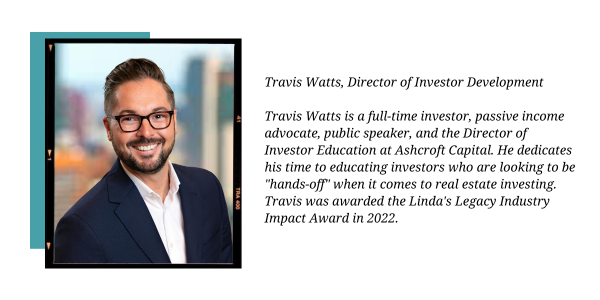February 27, 2024
By: Travis Watts, Director of Investor Development
Exploring the Financial Implications of Leaving Your W2 Job
In the realm of personal finance, few decisions rival the magnitude of leaving behind the security of a W2 job to pursue entrepreneurial ventures or become a full-time investor. It’s a decision with complexities, uncertainties, and profound implications for one’s financial future, but it may be a risk worth taking. In this article, we’ll explore some considerations if you are looking to take the leap yourself.
Key Considerations Before Leaving Your W2 Job
1. Building a Financial Safety Net
At the heart of the transition lies the importance of financial preparedness. Establishing a cash safety net, typically six months of living expenses, serves as a buffer against unforeseen events in the near term. New businesses can take time to become profitable, and new investments can take time to yield results.
Depending on your circumstances and desired path, you may warrant a more conservative approach, necessitating a year’s worth of reserves or alternative liquidity sources. Planning and budgeting accordingly can improve the odds of long-term success.
2. Navigating Health Insurance:
Transitioning from an employer-sponsored healthcare plan to private insurance entails a reevaluation of healthcare costs. Understanding the financial implications of health insurance premiums is paramount, as the cost may come as a surprise if you have never shopped for private health insurance.
A recent ValuePenguin.com analysis found that in 2024, Americans will spend a record $584 per month, or $7,008 per year on health insurance, if they purchase a private health insurance plan.
The cost of private health insurance varies based on several factors, including how you buy your plan. When you buy private health insurance through your state or federal exchange, you could be eligible for subsidies to help with monthly payments and other insurance costs.
3. Prioritizing Passive Income
Whether embarking on entrepreneurial endeavors or embracing full-time investing, prioritizing passive income is imperative. Passive income offers a world of possibilities from offsetting monthly expenses, adding flexibility to your lifestyle, and providing long-term financial security. According to the legendary investor Warren Buffett, free cash flow—the cash remaining after a company has covered expenses, interest, taxes, and long-term investments—is the most crucial metric.
With this in mind, if you are starting a business, how long will it take before it cash flows? If the business will not cash flow, how will you generate income in the meantime? For investors, cash flow is often overlooked and is not widely taught. Many financial products are intended to be held for long-term equity growth and appreciation. If you intend to venture out today, these may not be useful. Suppose you invested 100% into growth investments and the market declines for the next two years. How will you generate income?
4. Evaluating Credit Dynamics
The role of credit in post-transition endeavors cannot be overstated. While W2 income is often most favorable with lenders, self-employed individuals may encounter challenges in accessing credit once they branch out on their own. Proactively addressing any upcoming credit needs, like obtaining a mortgage, financing a vehicle, personal loans, or opening new credit cards while you still have W2 income, can put you in a better position for making the transition.
5. Embracing New Income Opportunities
If you are departing from a W2 job to pursue investing, it does not have to mean active income is a thing of the past. Many investors choose to pursue part-time employment, side hobbies, passion projects, or charity work and often derive fulfillment and financial rewards beyond the traditional 9-5. Many widely known investors. such as Carl Icahn, Jack Bogle, George Soros, and Peter Lynch, have active income sources aside from their investments and Investors are actively engaging in their careers well into their 80s and 90s.
6. Worst-Case Scenario – Reentry into the Workforce
The thought of branching out into the unknown can seem intimidating, but what is the worst-case scenario if your business or investments don’t end up supporting your lifestyle? There is always the option to return to the workforce, and guess what? That’s what everyone else is doing anyway. Here’s a quick example for perspective.
Boxing legend Mike Tyson earned nearly $400 million dollars during his career, then filed for bankruptcy in 2003. Since then, he “returned to work” and has been featured in films, commercials, and TV shows. He’s launched multiple businesses and even returned to the boxing ring in 2020. He has now reclaimed multi-millionaire status, albeit not at a $400-million-dollar level…yet.
Conclusion: Forging Your Path to Financial Freedom
The decision to leave your W2 job represents a profound juncture in one’s financial journey. It’s a decision that entails both risk and opportunity and demands planning and balance. While the path is not without its uncertainties, it can often unlock unparalleled growth and self-actualization. Ultimately, the decision to depart from the familiar shores of traditional employment is a testament to one’s courage, preparation, and unwavering commitment to charting a course towards new adventures and experiences. To your success.
Want to explore more content like this?
Tune into new episodes of The Passive Income Lifestyle on YouTube
Sources:
- Shepard, Daniel. “Average Cost of Health Insurance (2024).” ValuePenguin. December 15, 2023. https://www.valuepenguin.com/average-cost-of-health-insurance.
- Mishra, Neena. “Why Investors Should Focus on High Cash Flow Stocks & ETFs.” yahoo!finance. August 29, 2023. https://finance.yahoo.com/news/why-investors-focus-high-cash-162900708.html.
- Rodgers, Josh. “How Mike Tyson Earned $400M, Filed For Bankruptcy, And Recovered.” AFROTECH. April 19, 2023. https://afrotech.com/mike-tyson-bankruptcy.
- Nelson, Allie. “Pigeons, Tigers, and Bears—Oh Mike! All About Mike Tyson’s Net Worth in 2024.” Parade. January 11, 2024. https://parade.com/celebrities/mike-tyson-net-worth.




